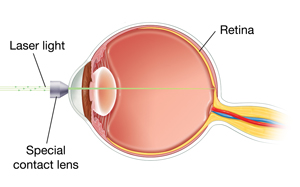Diabetic Retinopathy: Laser Treatment
Diabetes harms blood vessels in the retina. The retina is in the rear of the eye. This damage can cause vision loss or even blindness. This is called diabetic retinopathy. Laser photocoagulation may help slow or stop this disease. Laser treatment isn't always the best treatment option for diabetic retinopathy. It depends on your condition. Some people may need eye surgery or eye shots (injections). People who are planning to become pregnant or who are newly pregnant should be checked for diabetic retinopathy. This treatment may be needed in pregnancy.
What is laser photocoagulation?
This treatment uses a high-energy light source called a laser. The laser stops new blood vessels from growing in the eye. The laser is aimed at the retina. The heat from the laser causes scarring. The scarring limits the growth of new blood vessels. Lasers may also stop inflammation. This helps your eye heal and helps the eye absorb extra fluid. Sometimes laser treatment is combined with medicine. This may include shots of steroids or medicines that stop blood vessels from growing.

Types of laser treatment
The treatment you get depends on how much damage there is and where it is. Treatment may take from a few minutes to about 30 minutes. You may need more than 1 session or type of treatment. These include:
-
Pan-retinal treatment. This reduces growth of new blood vessels in the retina.
-
Grid treatment. This treats swelling in the macula. The macula is a spot in the middle of the retina that helps you see clearly.
-
Focal treatment. This seals up small areas of leakage in the retina.
Getting ready for laser treatment
-
Ask an adult family member or friend to drive you home after treatment.
-
Bring dark sunglasses to wear on the way home.
-
Tell your healthcare provider what prescription and over-the-counter medicines you take. Tell them what vitamins, herbal remedies, and other supplements you take. Tell them if you take aspirin, ibuprofen, ginkgo, warfarin, or other blood thinners.
-
Read the consent form. This is a form that says you understand the risks of the procedure and that you agree to proceed. Have all your questions answered before you sign the form.
During laser treatment
Laser treatment may be done at the healthcare provider’s office, hospital, or eye center. During the procedure:
-
You’ll be awake during the treatment.
-
The healthcare provider first widens (dilates) your pupil with eye drops. Then drops are placed to numb the surface of the eye.
-
They place a special contact lens on your eye. This is to help focus the laser on the retina.
-
You will be asked to stare at a light with your other eye. This is so your eyes don't move during the laser treatment.
-
The special contact lens is removed when the laser treatment is done.
After laser treatment
-
You may get an eye patch to wear. You may wear it for just a few hours. Or you may wear it for a few days.
-
You may be told to use eye drops.
-
You often don't need to stop taking blood thinners. But if you were told to do so, ask when you can start taking them again.
-
Ask when you can lift objects, exercise, and swim again. Ask when you can drive and return to work.
-
Ask for a number to call if you have problems or questions once you get home.
-
Ask for written discharge instructions. Ask the provider to print them in large print if you have low vision.
Controlling pain
Laser treatment rarely causes pain. You’ll be given medicine to treat eye irritation, if it occurs. Call your healthcare provider if you have a lot of eye pain or discomfort.
Risks and possible complications of laser treatment
Laser treatment risks and possible complications include:
-
Eye irritation
-
Bleeding in the retina
-
Retinal detachment
-
Scratched cornea
-
Watery eyes
-
Dilated pupils
-
Mild headache
-
Double, blurry, or decreased vision
-
Seeing spots
-
Glaring
-
Loss of night vision or side (peripheral) vision
-
Laser therapy doesn't work and vision is lost
When to call your healthcare provider
Call your healthcare provider right away if you have sudden pain or vision problems after laser treatment surgery.
Online Medical Reviewer:
Raymond Kent Turley BSN MSN RN
Online Medical Reviewer:
Rita Sather RN
Online Medical Reviewer:
Robert Hurd MD
Date Last Reviewed:
7/1/2022
© 2000-2024 The StayWell Company, LLC. All rights reserved. This information is not intended as a substitute for professional medical care. Always follow your healthcare professional's instructions.